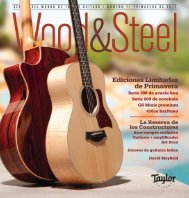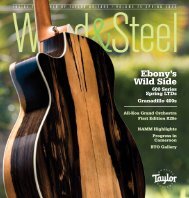The 2012 Taylor Line - Taylor Guitars
The 2012 Taylor Line - Taylor Guitars
The 2012 Taylor Line - Taylor Guitars
You also want an ePaper? Increase the reach of your titles
YUMPU automatically turns print PDFs into web optimized ePapers that Google loves.
susTaiNaBiliTy<br />
From the forest<br />
to the factory,<br />
<strong>Taylor</strong> practices<br />
eco-responsibility<br />
at every level<br />
As a guitar manufacturer, <strong>Taylor</strong> recognizes<br />
its role as an active participant<br />
in a worldwide ecosystem — both literally<br />
and figuratively — in which natural<br />
resources must be managed responsibly<br />
to safeguard their future. We take<br />
our responsibility to the environment<br />
seriously, and want customers to feel<br />
assured that when they purchase a<br />
<strong>Taylor</strong> guitar, they are supporting the<br />
highest levels of ethical, eco-conscious<br />
business.<br />
Sustainable forestry remains a central<br />
issue among instrument makers, particularly<br />
in light of recent legislation that<br />
includes the 2008 amendment to the<br />
U.S. Lacey Act and coming regulations<br />
from the European Union’s Forest Law<br />
Enforcement, Governance and Trade<br />
(FLEGT) organization. <strong>The</strong> spirit of both<br />
laws aims to ensure that only legally<br />
harvested timber makes its way into the<br />
U.S. or the E.U., and with these regulations<br />
come a variety of measures that<br />
wood purchasers must take to ensure<br />
the legality of the wood they acquire.<br />
For <strong>Taylor</strong>, eco-management extends<br />
beyond simple legal compliance. It<br />
means applying the same innovative<br />
thinking that drives our guitar-making<br />
refinements to develop better, smarter<br />
ways to use natural resources, reduce<br />
waste, and promote their long-term<br />
availability.<br />
As we’ve shared in past issues of<br />
Wood&Steel, our staff, including Bob<br />
<strong>Taylor</strong> and members of our milling and<br />
purchasing departments, actively travel<br />
the world to investigate firsthand the<br />
sourcing of our wood. We’ve developed<br />
pioneering partnerships with<br />
environmental organizations like Green-<br />
Wood Global, a non-profit organization<br />
that empowers indigenous, forestbased<br />
communities to support themselves<br />
through sustainable forestry<br />
practices. Our work with GreenWood<br />
in Honduras has led to a successful<br />
new paradigm of social forestry, allowing<br />
several villages to participate in the<br />
sustainable harvesting of mahogany.<br />
Our commitment to sustainability is<br />
also reflected in the business relationships<br />
we forge with our suppliers and<br />
vendors. Internally, our Responsible<br />
Timber Purchasing Policy provides an<br />
ethical framework that guides our purchasing<br />
decisions through the entire<br />
supply chain and requires our suppliers<br />
to do the same. <strong>The</strong> emphasis on<br />
clear policies and communication has<br />
helped <strong>Taylor</strong> develop a strong network<br />
of compatible long-term partners.<br />
“We have worked with many of the<br />
same suppliers for 10 or 20 years,”<br />
notes Charlie Redden, <strong>Taylor</strong>’s Supply<br />
Chain Manager. “As a result, we<br />
understand their business and they<br />
understand ours. We regularly discuss<br />
the entire supply chain process with<br />
them, and if necessary, educate them<br />
about the implications of changing legislation.<br />
Our suppliers understand and<br />
appreciate how it affects our company<br />
and their business as well.”<br />
Innovative Measures for<br />
Responsible Manufacturing<br />
Beyond the forest, <strong>Taylor</strong>’s manufacturing<br />
innovation has helped lighten<br />
our footprint on the environment. In the<br />
1990s, <strong>Taylor</strong> developed an environmentally<br />
friendly polyester guitar finish<br />
that doesn’t have the volatile organic<br />
compounds (VOCs) that are present<br />
in the nitrocellulose lacquer finish<br />
commonly used on other guitars. By<br />
changing our specifications for milling<br />
neck wood from mahogany trees,<br />
our NT neck design not only created<br />
a more stable, playable guitar neck, it<br />
also enabled us to increase the number<br />
of guitar necks yielded from each<br />
tree harvested by about 50 percent.<br />
Among our eco-minded industry partners<br />
are companies like Reflex Packaging,<br />
which uses recyclable materials to<br />
produce the guitar box inserts we use<br />
to cushion a guitar during transport.<br />
<strong>Taylor</strong> also has undertaken major<br />
recycling efforts across all levels of the<br />
company. In 2011, the company recycled<br />
and in some cases reused more<br />
than 35 tons of cardboard, 20,000<br />
pounds of paper and paper products,<br />
all plastic wrap, used printer toners,<br />
electronic equipment, batteries, fluorescent<br />
lights, blades, and electrical parts<br />
and components, including e-waste<br />
recyclables along with oil and coolant<br />
products. Much of our scrap wood and<br />
sawdust are converted into particleboard<br />
and mulch, while other pieces<br />
are donated to a local woodworking<br />
association to be transformed into toys<br />
for orphans in Tijuana, Mexico.<br />
Looking Ahead<br />
Initiatives currently in development<br />
include several new wood sourcing<br />
ventures that support long-term sustainability.<br />
As Bob <strong>Taylor</strong> reveals in his<br />
“BobSpeak” column in this issue, <strong>Taylor</strong><br />
has become the co-owner of a new<br />
company, <strong>Taylor</strong>-Madinter, which has<br />
purchased an ebony mill in the African<br />
nation of Cameroon. <strong>The</strong> mill will supply<br />
various manufacturers with legally<br />
sourced, fair trade ebony for fretboards<br />
and bridges. With the help of <strong>Taylor</strong>’s<br />
milling and manufacturing expertise,<br />
the mill will be able to reduce waste<br />
and provide guitar makers with an<br />
improved ebony product. Meanwhile,<br />
in Fiji, Charlie Redden and <strong>Taylor</strong>’s<br />
procurement team have been exploring<br />
opportunities to purchase sustainable<br />
plantation-grown mahogany through a<br />
government-managed program which<br />
gives land owners and tribes a defining<br />
voice in the future of the country’s<br />
forestry programs. <strong>The</strong> benefits of both<br />
initiatives include not only a more sustainable<br />
tonewood supply, but greater<br />
economic development and stability<br />
within the participating communities.<br />
We’ll continue to report on the progress<br />
of both projects in future issues of<br />
Wood&Steel.<br />
As <strong>Taylor</strong> continues to develop<br />
environmentally sound business relationships<br />
with suppliers, vendors and<br />
local communities, we hope to use our<br />
leadership position to help sustainable<br />
programs take root throughout the<br />
guitar industry.<br />
Opposite page (L-R): A road in Cameroon, where ebony is sourced; ebony fretboard blanks from Crelicam, a<br />
Cameroonian ebony mill now co-owned by <strong>Taylor</strong>; This page (from top down): <strong>Taylor</strong>’s environmentally friendly<br />
polyester guitar finish is applied using a combined robotic/electrostatic spray system, which dramatically reduces<br />
material waste; a stack of milled mahogany for guitar necks<br />
THE <strong>2012</strong> TAYLOR GUITAR GUIDE<br />
SUSTAINAbILITY<br />
65

















